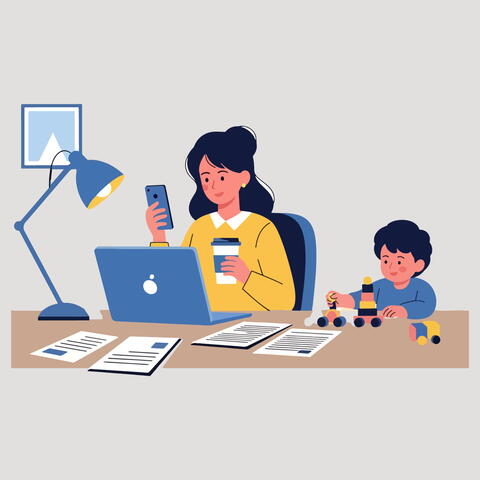
Our researchers address critical issues facing families and communities while promoting healthy human development and productive relationships. This work touches all of our lives. These discoveries are made possible through public and private investments, legislator support, multi-institutional partnerships, and the dedication of faculty and student scholars.
Below, we showcase recent examples of our most impactful research in the area of family and communities. You can also view and download a pdf version and subscribe to one of our ACES e-newsletters to stay abreast of new developments in ACES research.
Discover Our Family & Communities Research
Self-Checkout May Reduce Stigma

In a recent study, ACES researchers found that shoppers are significantly more likely to buy stigmatized products — such as condoms and pregnancy tests — when self-checkout is available. Using scanner data from grocery stores during the rollout of self-checkout (2008–2011), researchers showed that sales of certain “embarrassing” items rose once automation reduced human interaction. Even when self-checkout took longer, consumers valued its privacy. However, the study also found that shoppers still prefer human cashiers for fresh produce, floral items, and bulky goods. The researchers conclude that balance is key: maintaining both self-checkout and staffed registers best serves consumer welfare by offering choice, preserving privacy, and supporting efficient store operations.
Funding: All research in the College of ACES is supported by Hatch funding from USDA’s National Institute of Food and Agriculture.
ACES investigator:
Becca Taylor, Agricultural and Consumer Economics
Related news story:
Consumers prefer self-checkout when buying stigmatized products, study shows
Green Spaces Improve Emotional Regulation in Young Children

New ACES research highlights the powerful role of nearby green spaces in supporting children’s cognitive and emotional development. Using data from 435 Midwestern families in the STRONG Kids2 project, researchers found that access to trees, sandboxes, or outdoor storage before age 2 was linked to stronger attention and self-control by age 4. Features like decks and farm environments were associated with better emotional regulation. Green spaces also corresponded with lower household chaos, suggesting restorative benefits for families. However, children in noisier, less-structured homes sometimes developed greater adaptability. The findings emphasize the need for policies that expand safe, accessible green spaces — especially in underserved neighborhoods — and encourage outdoor family activities to foster both child development and caregiver well-being.
Funding: All research in the College of ACES is supported by Hatch funding from USDA’s National Institute of Food and Agriculture.
ACES investigator:
Samantha Irwinski, Human Development and Family Studies
Related news stories:
Green spaces boost children’s cognitive skills and strengthen family well-being
Lessons in green schoolyards benefit kindergarteners, especially girls
Experiences of nature boost children’s learning: Critical review finds cause-and-effect relationship
Adolescents Benefit From Parents’ Advice When They Seek it Out

Recent ACES research explores how African American parents’ advice influences adolescents’ social thinking during challenging peer experiences. Working with mostly rural, low-income families, researchers found that parental advice only supported youth social skills when teens actively sought it. When youth wanted help, detailed “cognitive restructuring” advice — guiding them to see peer conflicts in a less negative light — was linked to more positive social interpretations. Unsolicited advice did not cause harm, but unmet requests for support were associated with more negative peer perceptions. The findings highlight the importance of reciprocal communication: Parents should ask whether children want advice and, if so, offer specific, constructive guidance. Practitioners can help parents develop these skills to strengthen youth resilience and social confidence.
Funding: All research in the College of ACES is supported by Hatch funding from USDA’s National Institute of Food and Agriculture. This project was also funded by the National Science Foundation (grant no. BCS 0921271), the Eunice Kennedy Shriver National Institute of Child Health and Human Development of the National Institutes of Health (grant no. F31HD069152), and the Alabama Agricultural Experiment Station (grant no. ALA010-047).
ACES investigator:
Kelly Tu, Human Development and Family Studies
Related news stories:
Parents’ advice benefits African American youth – when they seek support
Study explores effects of racial discrimination on Black parents and children
How mother-youth emotional climate helps adolescents cope with stress
COVID Experiences: Thorns and Silver Linings

ACES scientists recently explored how families across the Midwest experienced the COVID-19 pandemic, revealing both hardships and silver linings that can inform future public health and policy decisions. Surveying 479 parents and youth, researchers identified nine major themes spanning personal growth, grief, shifting family dynamics, and coping strategies. Many families reported anxiety, sadness, and disrupted routines, while others gained maturity, empathy, and closer connections. The findings highlight stark inequities — those with stable resources fared better than essential workers or those facing financial strain. Researchers emphasize that future crisis responses must be flexible, empathetic, and community-informed. Building trust, addressing inequities, and supporting family resilience are key to improving preparedness and well-being in future public health emergencies.
Funding: All research in the College of ACES is supported by Hatch funding from USDA’s National Institute of Food and Agriculture. This study was also funded in part by the Institute of Government and Public Affairs, University of Illinois System (grant no. 22910).
ACES investigator:
Jacinda Dariotis, Human Development and Family Studies
Related news stories:
How the COVID-19 pandemic affected parents and youth: Thorns and silver linings
Illinois researchers explore COVID-19 vaccine attitudes and motivations, finding common values
Implicit social pressure may affect COVID-19 preventive behaviors, case study shows